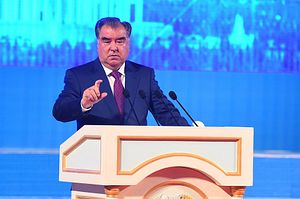This week, Tajikistan released a book of the president’s “wise thoughts and sayings.” Bearing the official and cumbersome title Wise Thoughts and Sayings of the President of Tajikistan, Founder of Peace and National Unity, the book may not become a bestseller in the traditional sense but that’s not really the point.
According to RFE/RL the 464-page book will be available from the national library’s website with a first print run of 500 copies. The book contains Rahmon’s wise views on peace, independence, history and, of course, women.
One gem quote provided by AFP reads, “National statehood, with all its attributes and symbols should take root in the mind and soul of every Tajik woman and be passed on from generation to generation through a mother’s milk.”
Like many regional leaders, Emomali Rahmon (who, by Tajik law, ought to always be named along with his title “Founder of Peace and National Unity”) seeks to enshrine his wisdom in print. Books by and about a leader are a necessity for a real cult of personality. One cannot, for example, visit China without noticing stacks of Little Red Books containing quotations from Mao Zedong in every market. It’s a tsotchke for tourists but also a reminder of Mao’s power, long after his death.
There are several ways to generate publications about one’s self. A leader could inspire such texts, but people are fickle and demanding, so best not to wait. A tried-and-true avenue, which has been taken by Kazakh President Nursultan Nazarbayev and Turkmenistan’s two presidents, Saparmurat Niyazov and Gurbanguly Berdimuhamedov, is to just write books yourself.
Niyazov’s tome — part autobiography and part spiritual guidance — was titled the Ruhnama and made mandatory reading. Government offices were directed to display the book and officials tested on its tenets. Even mosques were directed to place the book as centrally as the Quran. The Turkmenbashi mosque, which can hold 10,000 worshipers and was completed in 2004 (including a mausoleum for Niyazov, who died two years later) has scriptures from both the Quran and the Ruhnama on its walls.
Berdimuhamedov and Nazarbayev have been a little less blasphemous with their self-praise. There’s Nazarbayev’s 1999 autobiography My Life, My Times, And The Future and his 2008 book (with a forward from Margaret Thatcher) The Kazakhstan Way. Berdimuhamedov’s books are more topical, though not lacking in personality or national pride. He’s penned books on Turkmenistan’s famous Akhal-Teke horses and tea. During Nowruz in 2016, Berdimuhamedov gifted the book on tea — Tea: Remedy and Inspiration — to state officials, who kissed its cover and tapped it ceremoniously to their foreheads.
The next option — beyond sheer inspiration or authorship — is to get someone else to write nice things about you. If the political environment provides for it, other government officials and supporting politicians are perfect. Recently Nazarbayev was praised for his efforts to achieve peace in Syria (though perhaps prematurely) by one of his own advisers.
A variant of this option, if the funds are available, is to get an outsider to write a book. Nazarbayev and the Making of Kazakhstan, published in 2010 was authored by disgraced British MP Jonathan Aitken. In his review of the book, Jonathan Steele commented, “The flattery… ranges from the banal to the cringing.” The Aitken book was part and parcel of a larger drive by Astana to buy positive coverage through PR firms pitching laudatory op-eds authored by non-Kazakh B-list politicians.
The international community may not be hungering for Rahmon’s wisdom — his state remains Central Asia’s poorest and his government has marched ever further down the authoritarian road — or that of Nazarbayev or Berdimuhamedov, but Central Asia’s autocrats continue to deliver. And once the books are published, a leader can not only hand them out to schoolchildren and government workers, but translate them and share them abroad.

































